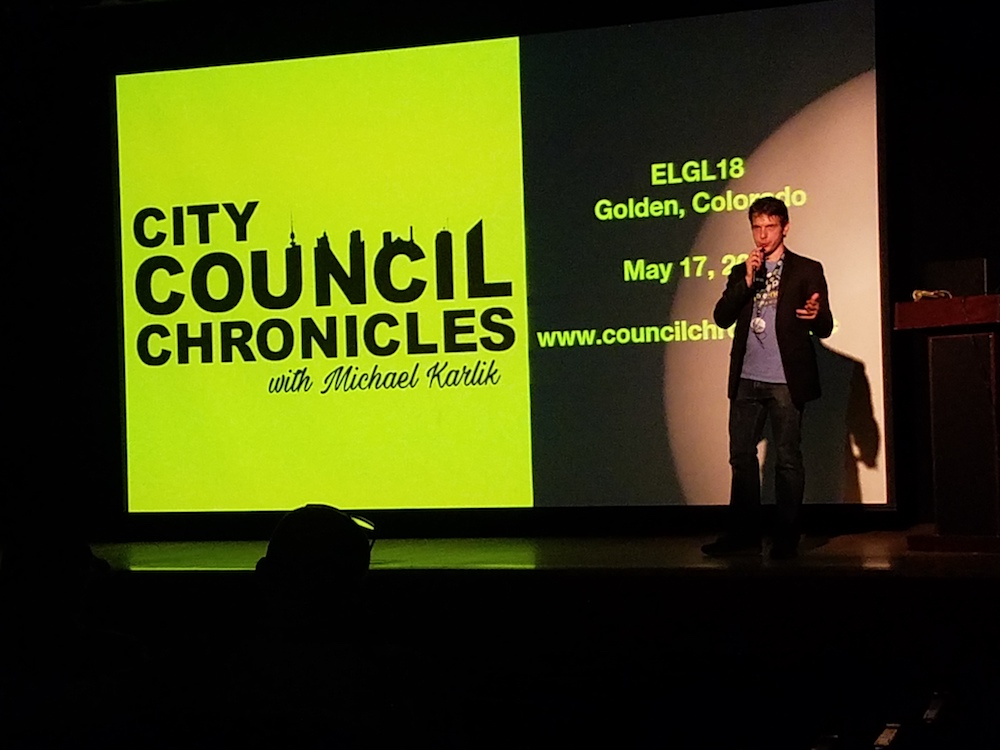Connecting state and local government leaders
Michael Karlik discusses his new podcast, “Tear It Down,” and his ongoing work to track the goings-on of city council meetings around the world.
For the past two years, Michael Karlik, the man behind City Council Chronicles, has been reporting on public meetings around the globe. Karlik, a consultant by day, expanded his journalism repertoire this month by dropping an eight-episode investigative podcast, “Tear It Down,” delving into behind-the-scenes government shenanigans in North College Hill, Ohio, a small suburb of Cincinnati.
The project took 10 months and is based on “nearly 200 hours of city council meetings, almost 60 hours of interviews, and hundreds of pages of documents, emails, and posts from social media,” according to the first episode. Karlik, who reported the story without ever setting foot in the Buckeye State, sat down with Route Fifty to answer questions about the podcast, his fascination with local government and why, exactly, he does what he does.
Route Fifty: The podcast is complex, but if possible, can you summarize what it’s about?
Michael Karlik: This is about a group of people who were dissatisfied with the way their local government was run. They wanted to change it, which is a natural impulse. They had very valid points of view about how poorly things were run. The problem was that their tactics were not as noble as their principles. They bumbled their way through a lot of things. They made people upset, they put the city in jeopardy, and they at times appeared to not know what they were doing. They talked a lot during the campaign but once they got into office it pretty much turned into a vengeful motivation and that’s what, I think, made it so hard and so personal. When you’re not passing legislation or acting on the policies you campaigned on, and you’re just focused on firing people or cutting salaries or or saying, “We won’t do anything until our demands are met”—a city government doesn’t work that way. Congress barely works that way. The story is kind of about what happens when Congress comes to small-town America.
Route Fifty: How did you find the story?
Karlik: I was fortunate that the story came to me. This councilwoman, Amber Bailey, was familiar with City Council Chronicles and thought I could help her with her problem. She said, “These people are mean. They’re bigoted. And I need help.”
You can deduce that City Council Chronicles is not intentionally about exposing bigotry, so at first I was like, "I don’t know if I’m the person to do this, but I can watch your council meetings and see what’s going on." And after I saw what was going on I thought, "Maybe I can do this."

Route Fifty: How did you decide it was worth following up on?
Karlik: The day she emailed me, I checked out the council meeting from that evening. They were in the middle of a fight about the city hall building, which was an old school building from the 1950s. The roof was leaking and half of the council thought it should never have been acquired by the former mayor to begin with. The other half felt it was a good space for recreational programs for the community. That was around the time they were deciding to just tear down the recreational side. Amber Bailey was frustrated and felt like council was not listening to the community and were not listening to her personally.
That was what I saw when she initially contacted me. At that meeting, yelling happened, feelings had been hurt, and at that point I had watched city council meetings of 150 cities worldwide, so I pretty much knew that city council meetings follow a template. You have a certain order of business. People have personalities they inject into various parts of the meeting but by and large, things are very calm. There’s no raised voices. Issues come up and get resolved and moved on. This just wasn’t happening in North College Hill. People were not moving on, and this was happening week after week. From an anthropological standpoint, I thought this culture is worth documenting.
Route Fifty: How did you decide to go about it in such an in-depth, investigative way, as opposed to, say, writing a blog post or a story?
Karlik: If you focus on the council meetings by themselves it’s easy to just focus on the surface—the yelling, the public commenters who show up and act ridiculous. But there’s a much deeper story here. In North College Hill, council meetings started being recorded for the first time in 2014, and a lot of what happened was before 2014.
Route Fifty: Did you tackle this by yourself?
Karlik: The story is 95 percent mine. I had a group of editors who guided me and kept me on track. They were emotional support, also, because there was a point probably four or five months in where each person I was talking to and each new council meeting I watched, there was something depressing or horrifying happening. I just got really down about having to uncover something sad every time. They kind of helped me ferret out what the relevant parts were.
Route Fifty: Were there advantages to tackling it solo?
Karlik: By not being affiliated with a news outlet and just doing it by myself and not having a deadline, I was willing to talk to anyone for however long they wanted. Some people I sat with for five or six hours over the course of multiple days just recording and getting their point of view. Maybe that’s a virtue of the format, of the storytelling podcast. With a traditional news outlet, there might be a rush to get to the important part. I’ve got 60 hours of tape recorded on my computer. I was very patient. I wanted to find out exactly what was going on from everyone involved in the story and I also wanted to have as much on hand as possible, so that they could tell it rather than me having to narrate.
Route Fifty: You never went to North College Hill. Was it hard to report on something like this without being on the ground?
Karlik: As an outsider coming in, we all know the stereotype of small-town America—that people there are skeptical and hesitant to talk to outsiders. I was really lucky that as many people talked to me on the record as did, but I think part of that was that they were able to do so in the comfort of their own homes, without being seen in public with a reporter shoving a microphone in their faces.
There were advantages as well. Having done City Council Chronicles for two years now, I had a network of people in local government who know what I do and why I do it. So when I saw something in North College Hill that raised my eyebrows, I could and did call up mayors, council members, and city managers elsewhere to ask, ‘Hey, this is what I’m seeing. Is this normal?’ Their responses prevented me from over-exaggerating or understating some of the behavior I saw, and any given city hall reporter might have had a slower time getting grounded on those parts.
Route Fifty: What’s the response been like?
Karlik: It’s been slow and steady. I’ve gotten very positive responses from people who have listened to it and that’s what I was hoping for—just a strong reaction, whether it’s people being proud of that city, or horrified, or any in-between emotions that happen over a range of episodes. I just want people to feel strongly about what’s happening in the city, and maybe pick up on that interest and learn about what’s happening in their own city.
Route Fifty: Would you do it again?
Karlik: There were parts I enjoyed a lot and there were parts that I didn’t. If someone comes to me with another story like that I’d be happy to look into it. Ideally, it would be something I could get paid for professionally. Though as far as hobbies go, telling the story of a city that’s been messed up for awhile is an interesting and unique hobby.
Route Fifty: Why do you cover city councils specifically?
Karlik: City councils are the only form of government besides school boards—which are not nearly as televised and accessible—where you have regular people doing serious business every week with a camera on them. Congress isn’t like that. Those people go to Washington, D.C. and you don’t really see them around town. They’re pros at saying things on camera and not really being vulnerable. State legislatures are kind of a scaled-down version of that. But city council members are going to the grocery store every week, they’re being accosted on their porches and their Facebook pages, and they generally have a lot of pressure to do the right thing in an environment where people are showing up and being angry at their faces.
Route Fifty: Just generally, why on earth do you do what you do? Why do you watch city council meetings in places you’ve never been to? Do you hate yourself? Why do you hate yourself?
Karlik: I do hate myself, but that’s a different conversation. The way I look at it is like looking at a singer or a pop rock group that’s been performing for 30 years. Why are they doing the same song every night? Don’t they get tired of that? I’m sure they do.
Route Fifty: I think the massive sums of cash they receive probably play into that.
Karlik: Right, but I sort of see you, the local reporter, as the rock star minus the money—covering the same thing day after day. Me, I’m the rock group, but one night I get to do Prince, one night I get to do Madonna, another night I get to do Michael Jackson. It’s a different city, a different council, a different structure, a different set of topics every time. That’s what keeps it fresh.
Local reporters, local council members, they’re the experts on that city, that government, that council. My expertise—to the extent you can call me an expert—is on how councils work. It’s me getting information, digesting it and spreading it out to the world. If people can use it to better their city or culture, that’s fantastic, and if it’s just pure entertainment value, that’s fantastic too.
Kate Elizabeth Queram is a Staff Correspondent for Government Executive’s Route Fifty and is based in Washington, D.C.

NEXT STORY: Legal Sports Betting Is About to Sweep the Nation. Services for Gambling Addicts Probably Won’t.



